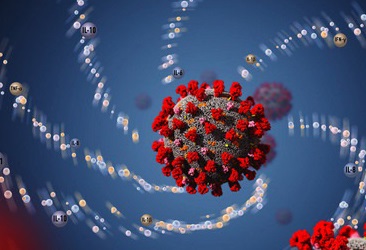Indian Researchers Find That Interleukin-9 (IL-9) Worsens COVID-19 Infections and Airway Inflammation
COVID-19 News - Interleukin9 - IL9 Jul 13, 2023 2 years, 5 months, 3 weeks, 4 days, 1 hour, 30 minutes ago
Indian Researchers Find That Interleukin-9 (IL-9) Worsens COVID-19 Infections and Airway Inflammation
COVID-19 News: In a recent study conducted at the Translational Health Science and Technology Institute in Haryana, India, researchers have made a significant breakthrough in understanding the role of interleukin-9 (IL-9) in aggravating SARS-CoV-2 infection and worsening airway inflammation. IL-9, known for inducing airway inflammation and bronchial hyperresponsiveness in respiratory viral illnesses and allergic inflammation, has now been found to play a pathological role in COVID-19 as well.

The study, which utilized a K18-hACE2 transgenic mouse model, demonstrated that IL-9 contributes to the spread of the virus and exacerbates airway inflammation caused by SARS-CoV-2 infection. Mice with a deficiency of the transcription factor Forkhead Box Protein O1 (Foxo1) in their CD4+ T cells produced significantly less IL-9 upon SARS-CoV-2 infection compared to the control group. These Foxo1-deficient mice showed resistance to the severe inflammatory disease associated with COVID-19. Furthermore, the introduction of exogenous IL-9 increased airway inflammation in Foxo1-deficient mice, while blocking IL-9 reduced and suppressed airway inflammation in SARS-CoV-2 infection. This discovery provides compelling evidence for a Foxo1-IL-9 mediated Th cell-specific pathway that plays a significant role in COVID-19.
The study sheds light on the inflammatory pathways involved in SARS-CoV-2 infection, offering a potential avenue for the development of host-directed therapeutics to mitigate disease severity. Severe COVID-19 cases often involve broncho-alveolar inflammation and immune cell hyperactivation as shown in previous case series, studies and
COVID-19 News reports. The study team emphasized the importance of immune suppression in controlling the severity and mortality of COVID-19, as demonstrated by the use of dexamethasone, an anti-inflammatory drug, in hospitalized patients.
Autopsy histopathology of pulmonary samples from COVID-19 patients revealed increased accumulation of eosinophils, basophils, neutrophils, and mast cells in the lungs. Mast cells, in particular, were found to be one of the prominent cell types in bronchoalveolar immune cells of COVID-19 patients. Interleukin 9 (IL-9), primarily produced by Th9 cells, was identified as a cytokine that promotes mast cell growth and function in allergic inflammation. While IL-9's role in severe airway inflammation and bronchial hyperresponsiveness has been established in asthma and respiratory syncytial virus (RSV) infection, its involvement in SARS-CoV-2 infection and associated immunopathology remained unknown.
The study team explored the transcription factors necessary for IL-9 induction in Th9 cells, identifying Foxo1 as a key factor essential not only for IL-9 induction in Th9 cells but also in other Th subsets. They demonstrated that Foxo1-IL-9 axis controls two distinctive pathological features contributing to the progression and severity of COVID-19: the regulation of anti-viral pathways and airway inflammation. The involvement of CD4+ T cells and their cytokines in regulating anti-viral response and airway inflammation in SARS-CoV-2 infection
had not been previously established.
IL-9, primarily produced by Th cells, has been found to enhance the severity of SARS-CoV-2 infection. It was detected in bronchial secretions of infants infected with respiratory syncytial virus (RSV). Additionally, IL-9 was upregulated in active COVID-19 patients and in hamster and ACE2.Tg mice infected with SARS-CoV-2. Depletion of IL-9 was found to enhance viral clearance while regulating airway inflammation and lung pathology in SARS-CoV-2 infection.
The study team also noted an association between IL-9 and mast cells, as IL-9 promoted mastocytosis and mast cell functions, leading to increased airway inflammation. These findings indicate a potential crosstalk between IL-9 and mast cells in SARS-CoV-2 infection.
The study findings further revealed that IL-9-producing Th9 cells contribute to the progression of SARS-CoV-2 infection and associated airway inflammation.
However, IL-9 production by innate lymphoid cells (ILCs) was not observed in the lungs of SARS-CoV-2 infected mice. The researchers highlighted the essential role of Foxo1, as its deficiency in CD4+ T cells made mice resistant to SARS-CoV-2 infection and associated airway inflammation due to blunted IL-9 production.
Conversely, exogenous IL-9 or the transfer of Foxo1-sufficient CD4+ T cells made Foxo1-deficient mice susceptible to SARS-CoV-2 infection and associated inflammation, emphasizing the role of Foxo1 in CD4+ T cell-derived IL-9 in driving airway inflammation.
While the precise mechanism by which IL-9 suppresses anti-viral function remains unclear, the study team proposed that IL-9 may suppress the expression of anti-viral genes and interferon-stimulated genes (ISGs), leading to increased severity of SARS-CoV-2 infection. They suggested that IL-9 activation of the STAT3 pathway may suppress type 1 interferon response, as STAT3 negatively regulates type 1 interferon response. However, further experimental evaluation is required to validate this hypothesis.
The study's findings have significant implications for the development of potential therapies to mitigate respiratory viral illness and reduce disease severity. By targeting the Foxo1-IL-9 pathway, researchers may be able to develop host-directed therapeutics to modulate immune responses and alleviate the airway inflammation associated with SARS-CoV-2 infection. This new research provides crucial mechanistic insights into the role of IL-9 in COVID-19 and opens new avenues for the treatment of severe respiratory viral infections.
The study findings were published in the peer reviewed journal: Nature Communications.
https://www.nature.com/articles/s41467-023-39815-5
For the latest
COVID-19 News, keep on logging to Thailand Medical News
Read Also:
https://www.thailandmedical.news/news/breaking-study-finds-that-upregulated-interleukin-6-drives-development-of-rare-liver-cancers-covid-19-infections-causes-elevated-il-6-levels-in-many
